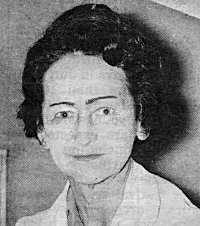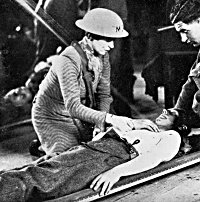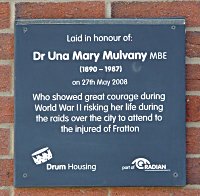
The following item is adapted from an article published in the Evening News on January 10th 1945
SOUTHSEA WOMAN DOCTOR AWARDED M.B.E. FOR BLITZ BRAVERY

"A Southsea woman doctor who was on duty at her first aid post during every raid on the City, and who risked her life over and over again in driving through shrapnel, flames and falling debris to help bomb victims, has been honoured with the award of the M.B.E. (Civil Division) in recognition of her services.
"She is Dr. Una Mary Mulvany, M.B., B.S., medical officer in charge of a first-aid post in St. George's Square, Portsea. The superintendent of this post, Nurse E. E. Field, has paid tribute to her inspiring conduct throughout the months of bombing.
"She was always on her way to duty within seconds of the first bomb falling, never waiting to be called," Nurse Field said. "By her unfailing courage and complete disregard of danger she set a wonderful example, and her kindness and cheerfulness gave great comfort to many people.
"On one occasion, when a building received a direct hit, Dr. Mulvany immediately went to the scene. She worked her way through the debris to reach three people who were trapped in the cellar, and administered morphia to them.
"Although she must have known there was imminent danger of the place collapsing, she remained with them nearly two hours. She risked her life in this way not once but many times.
"Dr. Mulvany told an Evening News reporter: "The sirens usually went in the middle of my evening surgery hours, but I used to wait until a raid actually started before I left my patients. When bombs began to fall I would send my patients to shelter and go straight to Portsea.

"The drive I remember most clearly was my return to the post in the second half of the January fire blitz, when the City was blazing. I had to go to an incident in the High Street, finding my own way along the streets which were still unblocked, over flaring gas-mains, water-pipes, and burning buildings.
"A fireman at one, place called out to me, 'You'll never get to the High Street' but I told him, 'I've got to get there,' and in the end I did.
"On another occasion my car was buried in falling debris, and once I drove into a bomb crater and had to abandon the car. Our district had a bad time in every raid, but the people were wonderfully brave."
Daughter of the late Alderman Dr. J. Mulvany, Dr. Una Mulvany was born at Portsmouth and began her education at the Convent of the Cross, Southsea. Later she studied at Durham University School of Medicine, returning to practice at Portsmouth, where she has lived ever since.
Dr. Mulvany is married to Captain B. R. Swanston, R.N., and has a daughter aged nine. One of her chief interests is in horses and riding, and in peace time she was a keen follower of the Hambledon Hounds."
Women at War
The following reminiscence by Dr. Mulvany was collected by the WEA Local History Group and published in their booklet "Women at War"
"The first aid postscame under the Department of the Medical Officer of Health. They were built in different parts of the city, where it was thought they would be most needed. The medical officers and the staff were appointed by the Medical Officer of Health and his committee. Before the war commenced there were lectures and demonstrations given which were invaluable, especially the practise of combined services, namely hospital, ambulance, fire, ARP and the doctor and the staff of the first aid post as it would be during an air attack. At the beginning of the war I was asked by the Medical Officer of Health if I would accept the appointment of a doctor in charge of a first aid post in St. George's. This I did. I felt it's being in Portsea, an area where a great many of my patients lived, and could be reached quickly by me, both from my home at Bradford Junction and my surgery in Arundel Street. The staff consisted of six to eight, plus a sister in charge all of whom had received training in first aid work.
My staff were excellent in every way. They were all brave, competent and wise and sensible with casualties. The post consisted of five or six cubicles which would take stretcher cases; also a waiting room and dressing room with all the medical supplies. Attached to the post was a large air raid shelter, situated behind it underneath the ground. It could be entered from the outside and was used by a great number of people from Portsea. There was also a staircase leading down from the post, so casualties who had been treated could go down until the raid was over. The more seriously ill ones would remain in the cubicles until they could be taken to hospital by ambulance. Many of the minor injuries were treated in the post. I can remember so vividly the dirt in the injuries. There seemed to be a special smell to the dust and debris with which they were often covered.
After dealing with the wounds in the best way that was possible, every casualty was given an injection of anti-tetanus serum, then if necessary with morphia or lighter analgesic and if possible of course a cup of tea. Those going to hospital would have labels attached to them, giving details of injection or treatment that had been given, this was signed by me. The ambulance service was wonderful. As well as bringing casualties to the station, often while a raid was in progress, they would then collect them and take them to hospital. I cannot speak too highly of the sister in charge of my post: Miss Eileen Field. When a raid started, often before I had finished evening surgery, I would go at once to the post. My Mother, although she was so frightened of the raids, would not leave the city because of me. She would take all the patients who were still there down to the basement of her house. The billiard room was large and as safe as anywhere could be. As well as my patients, many people from neighbouring houses, especially from Britannia Road North would also come for shelter. When I got to my post, Miss Field would have everything ready for me. The hospitals who, according to pre-arrangement, would be taking casualties, all the ambulance stations and fire stations also. She was utterly competent, an excellent nurse in every way, kind and reassuring to so many who were indeed frightened. She would then the next day see what fresh supplies of drugs and dressings were needed, and these were supplied from the Medical Officer of Health's department.
The air raids really started in 1940. The first incident I was called to was a direct hit on a public house on the Hard, directly opposite the road which leads to the railway station and the ferries to Gosport. I was called as the ARP rescue men had been able to dig a tunnel through to the rear of the house to a cellar, in which there were many people trapped, and they wanted to know if any were alive. The tunnel was big enough for me to crawl through. They were good and brave to have made this tunnel. I crawled through flat out, clutching my first aid bag and I came to a small open space. It obviously was a cellar and had a bench on one side, on which three or four people were still sitting. I was able to get to them to see if there were any signs of life, but there were none. Then I heard a faint voice, and I was able to crawl over the debris in that direction, and found a man there, who was obviously still alive. He was buried in debris, but not his head, as might have happened to the other occupants. I told him I would give him morphia that night, but that might make him sleepy, and if he could manage without, he would be able to direct the rescue men to where he was. He said he could, so I crawled back through the tunnel and directed them to where they would find him. I was so relieved the next day to know that he'd been got out alive and that he recovered. Later I had such a nice letter from him. These are the things one remembers.
Another direct hit was in Lion Terrace, and there a woman had been rescued, but they were not sure if she was alive or not. I went at once and was so sad to find a dear patient of mine I'd only seen the day before, but she had been killed outright. And so the raids went on. I will never forget when doing my rounds the next day, seeing groups of people looking at the notice boards outside the police stations, where the names of those who were died, injured or missing were listed. All over the city, good strong air raid shelters had been built, and people would fly to these with small parcels prepared for the night. One on the top of Portsdown Hill was especially strong, and many people would go up to it for the night, even in the afternoon or early evening before the raid started.
Those who were in Portsmouth during the night of the January the 10th 1941 could never forget the fire blitz on the city. Directly after the sirens incendiaries were falling everywhere. As I left for the post, already the roofs of Immanuel Church and the Priory Inn just opposite my home in Victoria Road North were alight. As I got to the Guildhall, the blaze was just started. The firemen could do nothing, as the Germans had timed this raid when the tides were such that there was no water to be supplied. In my post that night there were burns to be treated, and although it was such a horror, people were helping one another. When the raid had finished and there was no more for me to do, I managed to return home, wondering if I would find that ablaze also. Apparently an incendiary had come down through the skylight, but an airman who had come down with his wife to see me, was still there, and helped put it out. You can imagine how grateful I was to find my mother safe, although terrified. One could scarcely believe it, when almost within an hour it seemed the sirens went again.
But this time I had great difficulty getting to the post. Kings Road was ablaze on both sides. By the Guildhall that was impossible, that was then burning fiercely, and there was a fire running from the gas main all over the square. I then tried High Street. This was a nightmare, houses burning both sides and I got safely through this. However, in the road by the power station there was a basket of incendiaries still burning all over the road. Determined to get to the post, I charged through these, and regretted that I had filled up with petrol that morning. When the all clear went and I had finished my work, I returned home sadly through our destroyed and burning city. I found my home intact, although surrounded by fires.
Other incidents comes to mind. The air raid shelter in St. George's Square had a direct hit, but fortunately it was not a big bomb. Some of the people sheltering were injured but none killed. Another time a wall of the post itself was blasted down. So after the raid, Sister Field and I started moving drugs and other medical supplies to the school nearby in Kent Street. This was soon stopped: I turned a corner and went straight into a bomb crater. So there was no more moving of supplies that night. The car had to be left with the bonnet nicely down in the crater. We were able to crawl out. It was a good strong car, though, and early the next day Wadhams, who did so many repairs for me, had it rescued and got it going again by 11 a.m.. Three times I had to have a new windscreen fitted because it has been blasted out. There are also of course, many other incidents like these. My surgery in Arundel Street was also bombed, and after that I continued my practice from my home in Bradford Junction.
Throughout all those years, the memory that remains so clearly were the bravery of the services, and of all the people. There was comradeship, a friendliness, all helping each other and just carrying on. How Churchill's voice on the radio would give us heart! Counteracting the voice of the traitor Joyce, who would tell us, in that horrible sarcastic drawl of his, what parts of the city would be next destroyed. Through all this I worked all day long for my patients. I had a retired doctor, an ex-naval commander, who would come in from Cosham and do a morning's surgery and some visits for me. I would visit all through the day until 5p.m. when I would start my evening surgery, often curtailed by the raids. The people were so grateful for a visit, and would ask for one as little as possible. There were not so many doctors left in the city, but we had an understanding that patients of doctors who were away would be looked after also. I would do a long list of visits on the Saturday and Sunday, of patients who should have a weekly or monthly visit, and so free the rest of the week for what would arise. I did manage a lot of maternity work, the patient often not seen before an urgent message for the midwife to come. I must have delivered very many babies. Sometimes a difficult delivery, with only a midwife, who had remained so faithfully by her patient, and then perhaps the mother or friend to help. To find one's way in the war was difficult, as we were allowed only one hooded headlamp to drive by. Later in the war the smoke screen would spread over the city and make it almost impossible unless one knew the way, which I generally did. At last the war ended, and if you asked me what I remembered most of it all, to say again the bravery of my own staff at the post, of all the services and of the people of Portsmouth."

Further Information
Dr Mulvany was honoured by the erection of a plaque and the naming of a block of flats and offices after her in Cumberland Road Southsea in 2008. The plaque was unveiled by the Lord Mayor of Portsmouth, Councillor Richard Jensen and Elly Mulvany, grand neice of Dr Mulvany in May 2008.
Dr. Mulvany's father John was a Portsmouth Borough (later City) Councillor for the St Barnabas Ward from 1892 (Fratton Ward from 1896) until 1910 when he was elected to the Aldermanic bench for the Kingston Ward. He retained this post until May 9th 1927 when he was lost at sea.
Acknowledgements
The extract from "Women at War" is reprinted courtesy of the WEA Local History Group.
Additional research by Cynthia Sherwood and Peter Rogers.